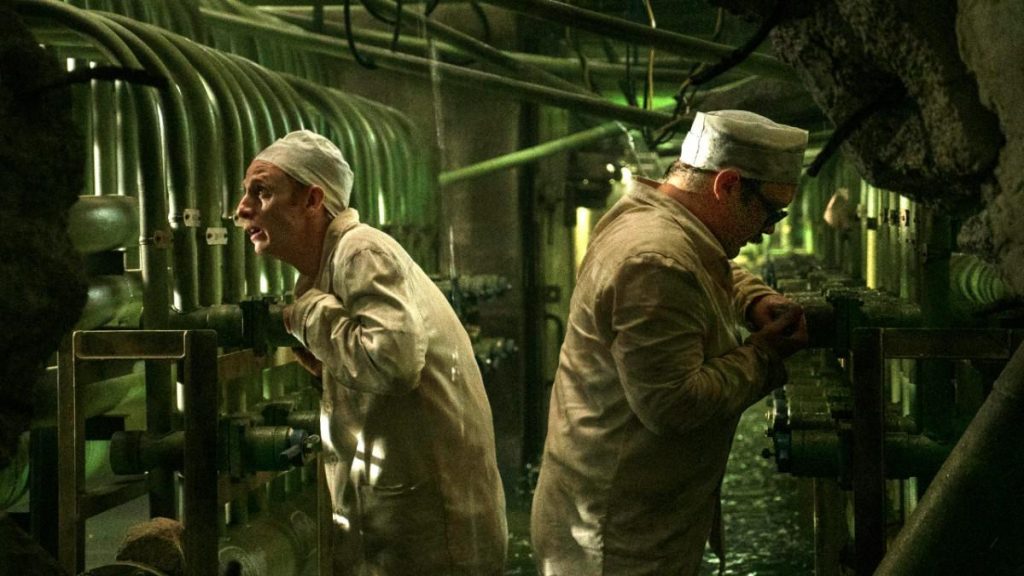
‘Chernobyl’ TV show review
By Bex Peterson, Editor-in-Chief
4.5/5
Fans of so-called “prestige TV” who might have cancelled their HBO subscription after the controversial Game of Thrones finale will be missing out if HBO’s historical drama Chernobyl is any indication of the continuing quality of their programming.
The five-part miniseries was a joint production effort by HBO and Sky UK, airing between May 6 and June 3 and currently available through the streaming service Crave. Written by, of all people, the writer of The Hangover sequels Craig Mazin, the story follows the efforts of real-life figures Valery Legasov (Jared Harris) and Boris Shcherbina (Stellan Skarsgård) as they attempt to contain the effects of a nuclear reactor explosion near Pripyat in the Ukrainian SSR. What follows is a series that is one-part political thriller, one-part disaster horror, and one-part historical drama.
The showrunners have made no bones about the aspects of the 1986 Chernobyl disaster that were altered or dramatized for the purpose of a television adaptation. In fact, HBO released a five-part companion podcast series appropriately titled The Chernobyl Podcast available for listening on many platforms—including YouTube—which painstakingly examines each episode to divide fact from fiction.
“The last thing I ever wanted to say to people was, ‘Now that you’ve watched this, you know the truth.’ No, you don’t,” said Mazin in an interview with Vox. “You know some of the truth, and you know some of the stuff that’s been dramatized.”
One example of this alteration of the facts to build a compelling narrative is the fictional character of Ulana Khomyuk (Emily Watson), a brilliant and doggedly determined nuclear physicist who aids and advises Legasov throughout the series. Khomyuk is essentially metaphorical, meant to represent the efforts of a massive group of scientists who worked alongside Legasov throughout the containment and investigation process. A rotating cast of names and faces is far harder to track than a single character carefully constructed over five hours of television, after all.
As a drama series in and of itself, Chernobyl shines in its ability to balance tone and genre, never veering too far in the grimdark direction while also not shying away from the more horrifying aspects of the disaster. While there’s plenty of body horror with regards to the terrifying effects of radiation sickness, the camera knows when to cut away and pull back. In episode four, “The Happiness of All Mankind,” we’re forced to follow the efforts of drafted “liquidators,” clean-up crews with the unhappy task of hunting irradiated animals—mostly abandoned pets—in the containment zone. It’s a concept that could have easily drifted into the category of impossible to watch for animal lovers, but the directors and editors managed to do a lot with implication rather than graphic depictions of dogs and cats being gunned down.
If the series has a flaw, it’s where the balance between fact and fiction sometimes impacts the pacing and, despite my praise in the previous paragraph, tone. The series attempts to give a kind of global view of the Chernobyl disaster, from explosion to trial. This unavoidably leaves us with a front-loaded plot structure, with arguably the most exciting incident occurring in the first episode, resulting in a kind of four-hour denouement. The series keeps the drama going with the political thriller angle, as well as the inspired choice to save the events leading up to the explosion for the finale. The sort of odd couple buddy-cop vibe between Harris and Skarsgård is wildly enjoyable to watch, but Harris as the truth-seeking scientist fighting a corrupt state does once or twice veer slightly more towards the Hollywood melodrama in the courtroom scenes than one might expect or necessarily desire.
Overall, Chernobyl is a quality case study of how to skate that line between fact and enjoyable television, made even more enjoyable by its full accountability as a work of fact-informed fiction rather than a docudrama. It’s best enjoyed with a few research tabs open to answer the inevitable “did that really happen?” questions you’ll be asking yourself throughout—as well as a bottle of iodine pills at hand, just in case.
